Dear Editor
August 1,1834 will forever be considered a watershed day in the annals of black history. That was the day formal slavery was abolished in the British Empire. The slave trade within the British Empire had been abolished on the 1st of January, 1808. The Slave Trade Act was passed in the British Parliament on the 25th of March,1807. Despite the passing of this monumental law,slavery was still legal within the British Empire. Slavery continued to exist until Emancipation Day in August of 1834. The British Parliament passed the Emancipation Act in 1833. This made slavery illegal within the empire. However,slaves in the Bahamas and throughout the Caribbean were then placed in an apprenticeship program for four years.
The former colonial masters were required by law to teach their former slaves the needed skills to work and provide for themselves. After August 1838,the slaves would have to fend for themselves. The newly freed slaves had been provided for all their lives by their colonial masters. Being independent was a foreign concept to them. The slaves in New Providence fared better than the slaves in the Out Islands after Emancipation. In fact,the slaves in the Out Islands struggled just to survive. Many of them,according to historians, lacked the barest necessities of life. The Out Islands lagged behind New Providence economically because the colonialists and absentee plantation owners had failed to develop the islands. The same thing can still be said today about New Providence and the Family Islands. The Family Islands are still lagging behind New Providence after some 177 years of emancipation..
Slavery was a thriving industry in the 16th,17th,18th and 19th centuries. It was a way of life. This evil institution had become so integral to the economies of Europe and North America that many feared that the ending of it would mean an end to their prosperity. Many British aristocrats and politicians had a vested interest in slavery. They stood firmly in the way of emancipation. This institution brought them great wealth. Many of these British aristocrats were absentee plantation owners. These men were angry at the abolitionists for attempting to undermine their lucrative trade. The slave masters in the Bahamas were angry also. They resented the fact that Wilberforce and others were fighting to disrupt their way of life-which was enslaving Negroes. Emancipation meant the demise of the plantation system.
For over 350 years black Africans were kidnapped and shipped across the Atlantic to the New World,where they were auctioned off like cattle. Families and friends were torn apart,never to see each other again.
Many of our African forefathers,who were of the Malinke,Wolof,Kru,Ndongo and Mbundu tribes, came from West and Central Africa, according to historians. According to historian Michael Craton,”British and American planters preferred slaves from the northern regions of West Africa,where Negroes were accustomed to hoe cultivation and seasonal changes”( History of the Bahamas,page 178). Many of our African forefathers came to the New World from Senegambia, Upper Guinea and Angola.
Estimates vary,but most historians believe that as many as eleven to fifteen million slaves were taken from the continent of Africa and brought to the New World between the 15th and 19th centuries,where they were forced to work in the plantations. The slaves were captured by African slave traders and sold to the Europeans. The slaves were then crammed into the hulls of the slave ships like sardines. Our frightened forefathers were then sailed across the Middle Passage in grossly unsanitary conditions. Ventilation in the ships was poor. Conditions on board the ships were so bad that some of the Negroes committed suicide by refusing to eat or by jumping overboard in the ocean. According to historian James McCague,the food that the slave masters gave to the Negroes onboard the ships was coarse and unappetizing,but plentiful (The Long Bondage,page 24).
Many of the slaves died during the voyage across the Atlantic Ocean. According to historians,approximately 13 percent of them died onboard the ships. In a moving speech that was delivered in the British Parliament on the 12th of May, 1789, abolitionist William Wilberforce stated the following: ”It will be found,upon an average of all ships of which evidence has been given at the Privy Council,that exclusive of those (African slaves) who perish before they sail,not less than twelve and one-half percent perish in the passage”(Chauncey M. Depew,ed. The Library of Oratory: Ancient and Modern,page 101).
The Negroes who made it to the New World alive but were too sick,frail or disabled to work were brutally killed by their new masters. The slaves who came to the Bahamas were forced to work on the plantations in New Providence and in the Out Islands. Life wasn’t easy for the Negroes. They normally worked long hours. They had to become accustomed to living in a strange country. Those who resisted their masters were imprisoned, flogged or mutilated. The most rebellious slaves were expelled from the Bahamas. Many Negroes ran away from their masters. If they were caught,they were severely punished by the colonial government.
Historians have noted that the typical slave master allowed their slaves to marry. They wanted their slaves to procreate. This would mean more slaves for them. Many of the male slaves were very promiscuous. Many of them sired children all throughout the various plantations in New Providence and in the Out Islands. This is one trait of the Negro male slaves which has survived to this day in many Bahamian males.
Historians have noted that slaves in the Bahamas were treated more humanely than their counterparts in North America and the Caribbean. This might be true,but they were still slaves. Let us not forgot this fact. I find no comfort in knowing that Bahamian slaves were better off than American slaves. They were still considered to be sub-human. They were still treated like animals.
This is one reason why noted abolitionists like William Wilberforce,James Ramsay,Thomas Clarkson,Granville Sharp,John Newton,William Pitt,John and Charles Wesley and George Whitfield fought so hard to end slavery. It appears as if many Bahamians are not too interested in Emancipation. It is just another day off for them. I submit,however,that Emancipation Day is more important than Majority Rule and Independence. Emancipation laid the foundation for these two important days on our Bahamian calendar. Without Emancipation,there would be no Independence or Majority Rule for Bahamians. Without Emancipation,we would still be enslaved to our former colonial masters.
I believe that this important day, and the abolitionists who made it possible, should all get the recognition they so richly deserve. For too long now they have been either ignored or downplayed by many Bahamians. This is a crying shame!
Yours Truly,
Kevin Evans
A proud trukdriver


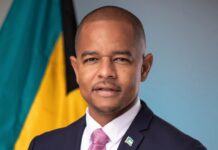
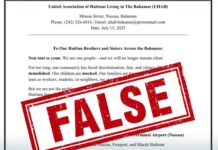
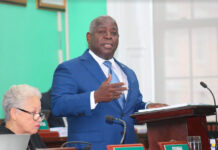

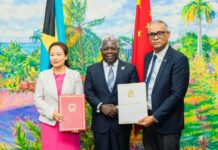
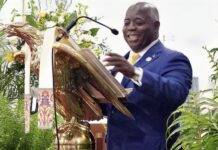
The people of the Turks & Caicos Islands are still in bondage. No, not because of direct rule but because the masses are still mentally enslaved.
H E L P U S !!!
Very interesting article …and a good read from start to finish as 177 years ago our forefathers celebrated emancipation by removing the shackles and chains from their hands and feet. However, 177 years later the Bahamians may be free in body….but are still imprisoned by mental slavery. Indeed, mental slavery is alive and sustained though various polices handed down by both regimes over the years….all designed to keep the citizens in a frozen psychological state on dependence. These policies range from unsustainable anchor projects concepts and included the “giving away” of nearly 100 percent of Mayaguana’s coastal area and nearly 10,000 acres, to non-Bahamians….to the more recent hasty decision to “facilitate wider foreign investment” in the restaurant and entertainment sectors.
While I half-heartedly applaud these marginal “efforts” to develop this country…in the long term these will simply force Bahamians to be in perpetual submissive state of dependence. Why can’t our policies move us from this submissive dependent state of low-skilled hotel jobs and catapult us in the realm of business owners at the management/ ownership level. Other countries – Cuba, Singapore – requires some form of local partnership, either in the form of equity stake or hands on participation. Similarly, the Bahamas can…and should… adopt this approach and enact policies the require Bahamians to be more involved, and bring startup capital and talent.
Let’s emancipate ourselves from mental slavery…and let freedom ring.
I am always amazed at how people get excited on these so called “anchor projects” and how mnay jobs they will create. So farm, most of these profects have created jobs where Bahamians are in low-skilled positions, i.e. bus boys, waitress, house keepers, etc. We wonder why Bahamians cannot afford land in reasonable areas in Bahamas earning such salaries. We have created a society where many Bahamians are not owners in their own country and cannot become owners… owners of land or businesses. We have Bahamians that go abraod and get an education only to have the job given to a foreigner with similar qualifications. Companies will bring in foreigners and pay 40 thousand for a work permit to bring in their chosen people and continue to pay Bahamians less than that individual. We have to create a society that empowers Bahamians- one in which when people educate themself, they can afford a “piece of the rock” whether it be they can afford to purchase a piece of property in the west rather thab cowpen road… where they can be managers earning the equivalent of a foreigner here on a work permit with similar qualifications, where Bahamians can be owners of businesses rather than just empoyees…
White Bahamians like me can celebrate this great day too. It brought an end to a great evil and put our black brothers and sisters on an equal footing…although there was a struggle still and prejudices and fears and misunderstandings had to be overcome and in some quarters this remains so…stupidly so. Today though we are all in the mix in a beautiful country with lots of potential and for sure, only together, can we make it work for the good of all of us and for our children. So happy emancipation day to everybody.
Let me say tho that plenty of our fellow citizens r still bound up in slavery but of a different kind – drugs alcohol and sex addictions and real poverty, a sense of helplessness and hopelessness this is modern slavery for many. so lets help them overcome these demons. we’re a national family so lets live like it and move forward togehter. God bless our land.
well said and well written i hope BLACK people in general get the message that we have to do better in order to save our race
Kevin I totally agree but alas here we are at the point in our history where a bunch of misfits thinks that to commenorate this most important event we ought to plant a damn tree!
This is what happens when we become so sophisticated that we take on other peopple’s idntity and not our own even to the point where we can’t even recognize and participate in our own history, shame and damn shame again.
Agitate Bahamians this is the only way forward now!
I think emancipation day and the knowledge about it is so important for us and and our children so give thanks for the word sound. I am an empress through the knowledge of emancipation as it is the truth about who i am as a black woman(slave decendent) that has set me free so all slave decendents know the truth and the truth will make you free stop living in bondage because you wont accept who you are
Comments are closed.